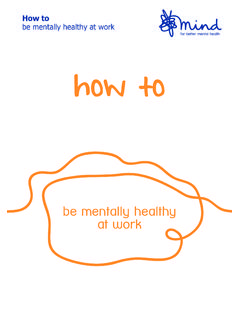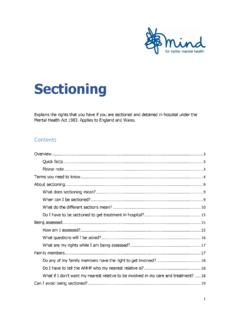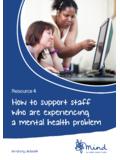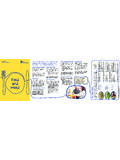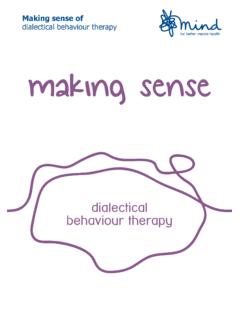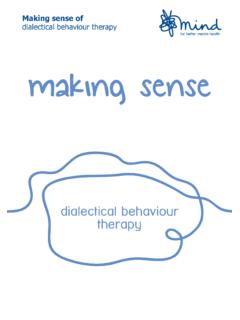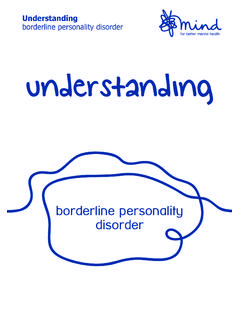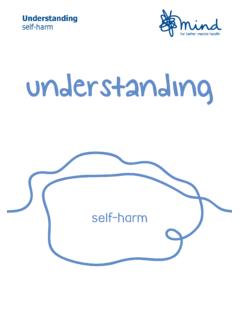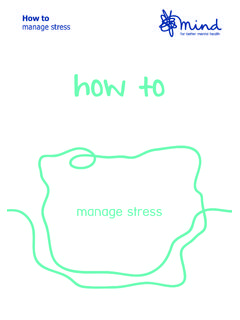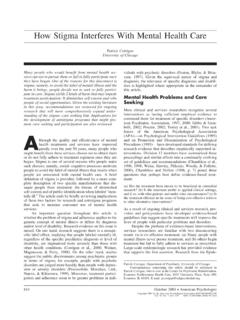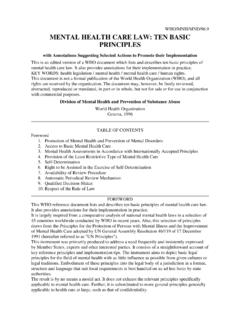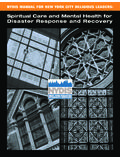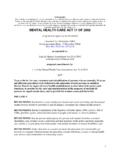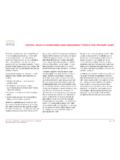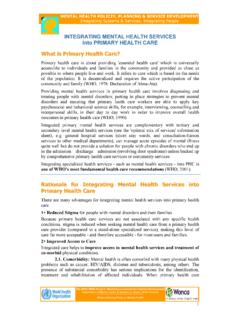Transcription of Mental health crisis care: physical restraint in crisis
1 Mental health crisis care : physical restraint in crisisA report on physical restraint in hospital settings in EnglandJune was I had some bad experiences of being restrained face down with my face pushed into a pillow. I can t begin to describe how scary it was, not being able to signal, communicate, breathe or you do to try to communicate, they put more pressure on you. The more you try to signal, the worse it is.** All the quotes in this report are from people who have either experienced or witnessed physical restraint .
2 Many are taken from interviews conducted between February and April health crisis care : physical restraint in crisis 3 Executive summaryFace down physical restraint is a life threatening form of physical restraint because of the severe impact it can have on breathing. It is a disproportionate and dangerous response to someone s behaviour when they are in a Mental health crisis . Face down physical restraint has no place in healthcare settings and there must be an immediate end to its key findings are2: The huge variation in the use of physical restraint across England is unacceptable.
3 In a single year, one trust reported 38 incidents while another reported over 3,000 incidents. Last year there were almost 1,000 incidents of physical injury following restraint . Face down restraint , which means pinning someone face down on the floor, is dangerous and can be life-threatening. It can feel like you re being suffocated and can cause even more distress. Last year alone it was used over 3,000 times. Yet some trusts have put an end to face down restraint key recommendations are: For Government to introduce an end to face down physical restraint in all healthcare settings urgently.
4 Include the use of face down physical restraint in the list of never events . For Government to establish national standards for the use of physical restraint and accredited training for healthcare staff in England. The principles of this training should be respect-based and endorsed by people who have experienced physical report sets out Mind s findings on the use and impact of physical restraint in Mental healthcare settings in England. Our research found huge levels of variation across the country in the use of physical restraint , and highlighted the psychological and physical injuries caused as a direct result of being physically restrained.
5 physical restraint is an extreme response to managing someone s behaviour when they are in a Mental health crisis . It can be humiliating, cause severe distress and at worst it can lead to injury and even 1998, David Rocky Bennett died at a medium secure Mental health unit. An independent inquiry found that he died as a direct result of prolonged face down physical restraint and the amount of force used by members of staff during the incident. The inquiry made specific recommendations about the use of physical restraint , especially in regards to face down or prone position , since Rocky Bennett s death there have been at least 13 restraint -related deaths of people detained under the Mental health Act 19831.
6 Eight of these occurred in a single year (2011). More than 15 years since Rocky Bennett s death, we are still no closer to implementing the lessons learned from his death and people are still dying as a result of physical is unacceptable that successive governments have neglected to take action, failed to establish national standards for the use of physical restraint in England and to introduce accredited training for healthcare restraint can be frightening and hugely disempowering for anyone, let alone someone in a highly distressed state.
7 It should only be used as a last Mental health crisis care : physical restraint in crisisForewordWhat this report also highlights is the lack of any progress in regulating and minimising the use of physical restraints in psychiatric is now 10 years since the publication of the Independent Inquiry into the death of David Bennett and 20 years since the inquiry into the death of Orville Blackwood, Michael Martin and Joseph Watts at Broadmoor Hospital. These inquiries drew similar conclusions about the use of physical restraint and made similar recommendations.
8 The Bennett inquiry was unequivocal in its recommendations about face down or prone physical restraint , identifying this procedure as carrying a significant risk of death to the person being restrained. Yet this and other recommendations made by the Bennett Inquiry and previous reports have still not been implemented. This is a major failure on the part of successive governments and the NHS. As data from the Independent Advisory Panel on Deaths in Custody shows, people continue to die in our psychiatric units as a result of being subject to physical restraint .
9 It is totally unacceptable that the lessons learnt as a result of the tragic deaths of Orville Blackwood, Michael Martin, Joseph Watts and David Bennett continue to be ignored and people using Mental health services still remain at high risk of injury and even death as result of the use of physical the grave psychological and physical risks associated with physical restraint , there is a compelling and urgent need for a common set of guidelines and national standards on the use of physical restraint in all settings, including Mental health S P Sashidharan Consultant psychiatrist and panel member of the independent inquiry into the death of David Rocky BennettThere is a fundamental contradiction at the heart of Mental health , between care and control.
10 While Mental health services in general are driven by the commitment to help and support people who are distressed or in crisis , many aspects of our work involve containment and control of people who are considered a risk to themselves or others as a result of their Mental health problems. This poses a significant challenge to clinical staff and those managing and regulating Mental health care . We have a huge responsibility to ensure that the power invested in us as clinicians is not abused and there are checks and balances in place to prevent harm and ill treatment of people who are at the sharp end of coercive psychiatric , it would seem many people using Mental health services continue to experience not only harm but serious injury and even death as a direct result of psychiatric interventions.
